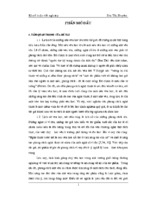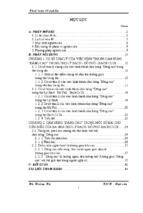BỘ GIÁO DỤC VÀ ĐÀO TẠO
TRƯỜNG ĐẠI HỌC CÔNG NGHỆ ĐỒNG NAI
BÁO CÁO TỔNG KẾT
ĐỀ TÀI NGHIÊN CỨU KHOA HỌC CẤP TRƯỜNG
A STUDY ON LEARNING SPEAKING SKILLS BY ENGLISH
MAJORED SOPHOMORES AT DONG NAI TECHNOLOGY
UNIVERSITY: DIFFICULTIES AND SOLUTIONS
(NGHIÊN CỨU VỀ VIỆC HỌC KỸ NĂNG NÓI CỦA SINH VIÊN
CHUYÊN NGÀNH NGÔN NGỮ ANH TẠI TRƯỜNG ĐẠI HỌC
CÔNG NGHỆ ĐỒNG NAI: KHÓ KHĂN & GIẢI PHÁP)
Mã số: TR:2020-08/NN-SV
Chủ nhiệm đề tài: Bùi Nguyễn Thiên Thư
Đồng Nai, 5/2021
BỘ GIÁO DỤC VÀ ĐÀO TẠO
TRƯỜNG ĐẠI HỌC CÔNG NGHỆ ĐỒNG NAI
BÁO CÁO TỔNG KẾT
ĐỀ TÀI NGHIÊN CỨU KHOA HỌC CẤP TRƯỜNG
A STUDY ON LEARNING SPEAKING SKILLS BY ENGLISH
MAJORED SOPHOMORES AT DONG NAI TECHNOLOGY
UNIVERSITY: DIFFICULTIES AND SOLUTIONS
(NGHIÊN CỨU VỀ VIỆC HỌC KỸ NĂNG NÓI CỦA SINH VIÊN
CHUYÊN NGÀNH NGÔN NGỮ ANH TẠI TRƯỜNG ĐẠI HỌC
CÔNG NGHỆ ĐỒNG NAI: KHÓ KHĂN & GIẢI PHÁP)
Mã số: TR:2020-08/NN-SV
Chủ nhiệm đề tài
Bùi Nguyễn Thiên Thư
Đồng Nai, 5/2021
DANH SÁCH THÀNH VIÊN THAM GIA
STT
HỌ TÊN
ĐƠN VỊ
VAI TRÒ
1
Bùi Nguyễn Thiên Thư
Khoa Ngoại Ngữ
Chủ nhiệm đề tài
2
Vương Thiện Ân
Khoa Ngoại ngữ
Thành viên
3
Trần Thanh Long
Khoa Ngoại ngữ
Thành viên
4
Trần Thị Phương Thư
Khoa Ngoại ngữ
Giảng viên hướng dẫn
TABLE OF CONTENTS
CHAPTER 1 INTRODUCTION ......................................................................................1
1.1 Background of the study.............................................................................................1
1.2 Problem statement ......................................................................................................1
1.3 Research aims and research questions of the study...................................................2
1.4 Significance of the study ............................................................................................2
1.5 Scope of the study ......................................................................................................3
CHAPTER 2 LITERATURE REVIEW ..........................................................................4
2.1 Definition of speaking skills and its importance ........................................................4
2.1.1 Definition of speaking skills ................................................................................4
2.1.2 The importance of speaking skills .......................................................................4
2.2 Types of speaking skills .............................................................................................6
2.2.1 Imitative ...............................................................................................................6
2.2.2 Intensive ...............................................................................................................6
2.2.3 Responsive ...........................................................................................................6
2.2.4 Interactive .............................................................................................................6
2.2.5 Extensive ..............................................................................................................7
2.3 Difficulties in Speaking Skills ....................................................................................7
2.3.1 Psychological factors ...........................................................................................7
2.3.2 Linguistics factors ..............................................................................................10
2.4 Previous studies related to the research ....................................................................13
CHAPTER 3 RESEARCH METHOD ..........................................................................17
3.1 Context of the study..................................................................................................17
3.2 Participants ...............................................................................................................17
3.3 Research tools ...........................................................................................................18
3.4 Data collection procedure .........................................................................................19
3.5 Data analysis procedure ............................................................................................20
CHAPTER 4 RESULTS AND DISCUSSION...............................................................21
4.1 Analysis of data ........................................................................................................21
4.1.1 General background information of participants ...............................................21
4.1.2 The problems in studying English speaking skill ..............................................22
4.1.3 Some solutions to improve English speaking skills ...........................................24
4.2 Discussion of results .................................................................................................25
4.2.1 Some problems in studying English speaking skills ..........................................25
4.2.2 Some solutions to improve English speaking skills ...........................................27
CHAPTER 5 CONCLUSIONS.......................................................................................31
5.1. Conclusions .............................................................................................................31
5.1.1. Psychological factors ........................................................................................31
5.1.2. Linguistics factors .............................................................................................32
5.2. Suggestions for further researches ..........................................................................34
REFERENCES .................................................................................................................36
APPENDIX .......................................................................................................................38
THÔNG TIN KẾT QUẢ NGHIÊN CỨU
ĐỀ TÀI NGHIÊN CỨU KHOA HỌC CẤP TRƯỜNG
(dùng cho Báo cáo tổng kết đề tài)
1. Thông tin chung:
- Tên đề tài: A study on learning speaking skills by English-majored sophomores at
Dong Nai Technology University: difficulties and solutions (Nghiên cứu về việc học kỹ
năng nói của sinh viên năm hai chuyên ngành ngôn ngữ Anh tại DNTU: khó khăn và
giải pháp)
- Mã số: TR:2020-08/NN-SV
- Chủ nhiệm đề tài: Bùi Nguyễn Thiên Thư
Điện thoại: 0908771706
Email:
[email protected]
- Đơn vị quản lý về chuyên môn: Khoa Ngoại ngữ
- Thời gian thực hiện: 8/2020 – 1/2021
2. Mục tiêu:
Tìm hiểu về những khó khăn khi học nói tiếng Anh mà sinh viên năm hai chuyên ngành
Ngôn ngữ Anh ở trường Đại học Công nghệ Đồng Nai thường gặp phải và từ đó có thể
đề ra các giải pháp giúp sinh viên cải thiện kỹ năng này.
3. Nội dung chính:
Đề tài nghiên cứu được tiến hành để tìm hiểu về việc học kỹ năng nói tiếng Anh của sinh
viên năm hai chuyên ngành Ngôn ngữ Anh với những nội dung chính là (1) tìm hiểu
những khó khăn khi học nói tiếng Anh mà sinh viên thường gặp phải và (2) đề ra các giải
pháp giúp sinh viên cải thiện kỹ năng này.
Phần 1: Giới thiệu tổng quan tình hình nghiên cứu thuộc lĩnh vực đề tài ở trong và ngoài
nước (tính cấp thiết; mục tiêu; cách tiếp cận)
Phần 2: Nội dung nghiên cứu gồm phương pháp nghiên cứu, đối tượng và phạm vi
nghiên cứu
Phần 3: Kết luận và kiến nghị
Phần 4: Tài liệu tham khảo
Phần 5: Phụ lục
4. Kết quả chính đạt được:
- Khó khăn lớn đầu tiên mà sinh viên thường phải đối mặt khi học nói tiếng Anh là
những khó khăn đến từ các yếu tố ngôn ngữ như là vốn từ hạn chế, phát âm không tốt
hoặc sai ngữ pháp;
- Khó khăn lớn thứ hai mà sinh viên gặp phải đó là các trở ngại về tâm lý: không tự tin
khi nói tiếng Anh, ngại giao tiếp với người nước ngoài, mất bình tĩnh ngay sau khi
mắc lỗi trong giao tiếp;
- Nghiên cứu cũng là cơ hội để sinh viên có thể tự đề xuất một số giải pháp giúp cải
thiện kỹ năng nói tiếng Anh và những giải pháp được sinh viên lực chọn là dùng tiếng
Anh hoàn toàn trong lớp, tham gia các lớp luyện phát âm, xem phim hoặc các chương
trình nói tiếng Anh có phụ đề, luyện nói trước gương, tập suy nghĩ bằng tiếng Anh,
tham gia các chương trình dạy nói tiếng Anh hoặc học qua các app, sinh viên cũng có
thể tích cực luyện nói tại lớp hoặc tham gia các câu lạc bộ hoặc nhóm học để rèn luyện
khả năng nói tiếng Anh của mình. Trong số đó, hai giải pháp được lựa chọn nhiều nhất
là xem phim hoặc các chương trình nói tiếng Anh có phụ đề - chiếm 86% và luyện nói
trước gương – chiếm 74%.
CHAPTER 1 - INTRODUCTION
1.1 Background of the study
Today, English is known as the general language of the world and has been
commonly used in many countries and territories. Therefore, more and more people are
studying this language to communicate and improve relationships with people who
come from other countries that have different cultures and different languages. English
has an important role in all different careers such as technology, construction, business,
education, and import-export, etc. If you want to have a superior profession, you need to
have a strong English foundation. Because of English determines 50% success in your
work, especially foreign corporations, or multinational companies. Obviously, it‟s great
when you are excellent in all four skills: reading, writing, listening, speaking, and the
opportunity to come to you more.
English is very important for communication to people around the world in today‟
life, and English is becoming the second language in many countries. With the
development of modern technology and science, the need to learn English in Vietnam
has been increasing on a daily, so most schools in Vietnam have in English education
program from primary school. As a matter of fact, students will study English from
Grade one to Grade twelve for the purpose of passing a written examination, reading a
school and college exams. Students learn grammar and vocabulary, practice
comprehensive reading text in textbooks. Most of all the university in Vietnam have a
faculty to studying overseas languages is foreign faculty, especially all of school have
English major. English-majored students will study English Skills, grammar,
pronunciation to use in life, in work.
1.2 Problem statement
When you learn English, or any language, communication skills are principal
skills, which is used daily in your study, your life and future work. It is proved that "The
world of communication in English is making a charisma these days. It has the power to
make the whole world revolve around it. It is central to all activities. Everybody has
realized the importance of communication and therefore, he/she wants to be a better
communicator. It has left no field untouched: be it a medical, or engineering, Arts or
Law, or even Sports or Music. However, at the bottom of these lies an effective
communication skill. If students fail to see the broader scenario of the corporate world
1
and ignore the communication skills, it can endanger a shallow level of understanding."
Dr.J.J. Magdum (2012:35). To put it another way, communication abilities assess
progress or failure in the use of the language of learners. Through it, audiences realize
the extent to which they speak. In addition, people who are good at speaking skills can
easily communicate with others and make life more effective than people who are poor
at communication skills. However, there are many people not really good for
communication skills, specially speaking skills since when learning English, they often
just "repeat what the teachers said, learn by heart new vocabulary, reciting a memorized
dialogue or responding to mechanical drill" (Shrum &. Glisan 2000: 26) or focus on
writing and grammar, rather than speaking and listening.
Consequently, at universities, English-majored freshmen and sophomores are
often face some difficulties when learn communication skills because they are afraid it,
especially speaking skills. To find the reasons why students afraid to speak, afraid to
learn English speaking skills, we need to ascertain difficulties of students when they
study speaking skills. In this research paper, I will study difficulties in learning speaking
skills of English-majored sophomores and solutions to improve student‟s speaking skills.
1.3 Research aims and research questions of the study
This study will focus on difficulties in learning speaking skills of Englishmajored sophomores at Dong Nai Technology University, and furnish some solutions to
overcome these difficulties by answer two research questions below:
1. What are the common difficulties faced by English-majored sophomores when
learning speaking skills at Dong Nai Technology University?
2. What are the solutions to overcome the difficulties of Dong Nai Technology
University English-majored sophomores when learning speaking skills?
1.4 Significance of the study
This study was conducted to understand how the sophomore students of Dong Nai
Technology University had difficulty learning English speaking skills. After identifying
difficulties, we can find out some solutions to resolve these difficulties to improve
students' speaking skills.
We hope this research will help second-year students at Dong Nai Technology
University improve their difficulties in learning speaking skills. Since then speaking
skills of students can be improved to serve for classroom learning as well as in life.
2
1.5 Scope of the study
The research is aimed to study the problems of English speaking skills of the
second year students in the Faculty of Foreign Languages of Dong Nai Technology
University, who are asked to be participate by answering the questions about the
problems of English speaking skills.
The study is divided into four scopes:
The scope of the Data
Focused on the study of the problems of English speaking skills of the
students in Dong Nai Technology University.
The scope of Respondents
The scope of the population in this study is focused on 50 second year
students which consists of Bachelor‟s Degree, Dong Nai Technology University.
The scope of Place
Dong Nai Technology University, Nguyen Khuyen Street, Quarter 5, Trang
Dai Ward, Bien Hoa City, Dong Nai Province, Viet Nam.
The scope of Time
Starting from August 2020 to October 2020.
3
CHAPTER 2 - LITERATURE REVIEW
2.1 Definition of speaking skills and its importance
2.1.1 Definition of speaking skills
When studying a foreign language, speaking skills are known to be the most
important communication skills. Speaking skills include a lot of factors such as
vocabulary, pronunciation, semantics, grammar. It presents ideas, feelings, intentions of
the speaker to the listener to know things the talker wants to talk to.
There are many definitions of speaking skills. Hornby (1990, p.1227) defines
“Speaking is to make use of words in an ordinary voice”. According to Chaney (1998),
“Speaking is the process of making and sharing meaning by using verbal and non-verbal
symbols in different contexts”.
In a different study, Brown and Yule (1983) defines "speaking is the capacity of a
speaker to tell something well to other persons as his listeners, thereby the listeners can
catch or understand his message or what he says and then give a response as evidence
that the oral communication could run smoothly. The speaker expresses his needs and
communication at least in short bursts”. According to Brown (1994) and Burns and Joyce
(1997) described speaking as the process of exchange of meaningful sentences, including
the construction, receipt and processing of information.
In addition, Bygate (1987) defines speaking as receiving information from the
hearing so as to generate reactions from the listener. It is considered to combine sounds
to form coherent sentences. Likewise, according to Donough and Shaw (1993),"Speaking
is a skill which enables people to produce utterances to make conversations in
communicating to achieve a particular end. The utterances may involve expressing ideas,
wishes or opinions, negotiating or solving problems, establishing or maintaining social
relationships".
We can infer a general definition of speaking from these above definitions.
Speaking means using words, intonation, stress, and semantics to construct sentences to
express their thoughts, feelings, ways of seeing and purpose for others to understand.
2.1.2 The importance of speaking skills
In English, speaking skills are very important. Listening, speaking, reading and
writing are the four main learning skills of English. However, speaking was considered to
be the most critical and challenging ability, since speaking is one of the main
4
communication factors that is really essential in all aspects of life. Therefore, people
learning English have to spend more time to practice these skills than other skills each
day. That said, speaking is one of the necessary abilities in life, as well as in work.
According to the viewpoint of Sesnan (1997) “when people learn their mother
tongue, they can always learn to speak first" and "in a public communication
environment, people often encounter the question "can you speak English?" rather than
"can you write, read or listen?". Absolutely, the important thing is not what people think
and do, it's what they're going to talk about. People evaluate the language used by each
individual through the way they express information directly rather than through the
intermediate stages.
On the other hand, the instrument for assessing the learners' success is manifested
in their speaking ability. It is defined that "Language learners regard speaking skills as
the most important skills which they can acquire and they assess their progress in terms
of their accomplishments in spoken communication." Burkart (1998). Besides, speaking
has a huge impact on listening, because if students make a mistake in pronouncing a
word, they can hardly catch as well as understand what the native speakers say and vice
versa. Therefore, in certain contexts, foreigners have to talk slowly to understand.
Having said that, “Speaking has a meaning when it enables children and young
people to explore their own selves and clarify their identity. They can manage to
understand and respect their own selves” Ranson (2000). It means that the speaker can
express his / her point of view, feel confident when discussing an issue. In other words,
speaking makes people around you better understand you as well as how you express
interest in people. This also makes them feel respected for their opinions and values.
In addition, Conrad & Dunek (2012, p74): “Speaking is a communication tool for
changing ideas”. This can be understood to mean that speaking is the best way to convey
emotions, to discuss ideas with others and to change their thoughts. Therefore, mastering
speech skills makes the speaker a comprehensive communicator. The secret to success in
your career is the ability to speak. Cleverness and insight in the use of words give the
speaker a distinct advantage, inspire the listener, thus gaining confidence and making
them respect.
In other words, speaking is a most important skill in the four skills of listening,
speaking, reading and writing. Through communicating everyday learner can develop
5
vocabulary, pronunciation, grammar. People can express their thought, their feeling, their
ideas, their dream by talk to other. Communication skills are very important to study, to
school. Another key point to remember is that communication skills, particularly
speaking, are the main skill to decide 50 per cent on success at work.
2.2 Types of speaking skills
Depending on Brown 's definition (2004, p.271), I recapitulate the types of speaking
skills in five groups as follows:
2.2.1 Imitative
When a child learns English, it will imitate his/her instructor maybe it‟s parents,
it‟s siblings, it‟s teacher. This is human‟s instinct, speaker can accidental repeats
following the instructor, but do not understand the things his/her speaking. In this way,
the speaker is passive in speaking. However, when imitate other in speaking, we can
learn how to pronounce words accurately and stress accents correctly.
2.2.2 Intensive
Intensive speaking is a type that requires you to understand, and has a good way to
convey it. This approach allows a speaker to have more vocabulary, and a better grammar
to communicate. For example, you're reading an essay, you need to understand it, you
need to re-present the text as you understand it, or you're listening to a story, you have to
tell it in your own words, you need to use your own words to express it, not to imitate it
50%.
2.2.3 Responsive
Response occurs during a conversation between two or more individuals.
Someone asked a question, and someone answered the question in order to share their
thoughts. Questions and responses are connected to each other.
2.2.4 Interactive
Interaction is an exchange of information between two or more participants in a
conversation. Interaction is the combination of response and intensive speaking.
Interaction makes it easier for people to get together in relationships, absorb more
knowledge, and make life more successful.
6
2.2.5 Extensive
Extensive often points to present something. This way of speaking need to you
have to be prepared, and take the time to choose your words. You must use words and
phrases to persuade the audience.
2.3 Difficulties in Speaking Skills
Speaking English has never been easy. There are many factors that make it
difficult for you to learn English. These factors hinder your ability to speak English
fluently and float away. There is also an impact from the inside out. Some factors
affecting English speaking are psychological factors, linguistics and other factors.
According to Mahripah (2014), Elhadi Nasr Elhadi Mustafa (2015) and I have noticed
some influences in the process of learning to speak English.
2.3.1 Psychological factors
Psychological factors are the biggest factor in the learning process, according to
Elhadi Nasr Elhadi Mustafa (2015). To be able to confidently speak a language, the first
thing you must dare to say. However, there is a fact that the bigger we are, the more
afraid we are. The fear of being wrong here is not wrong, but I'm afraid to laugh when I
say it wrong. Similar to a child who is just starting to learn to speak, it is the same for us
to learn English. There are words they always say wrong and adults have to fix many
times. Have you ever thought: if the children do not speak, how can adults correct them?
But children have better things than adults, that is, they are not afraid to be wrong, they
are not afraid of being laughed, they want to be communicated. That makes them
motivated to speak. The English learners too, if they dare not speak, they will only say it
wrong forever. In fact, there are many factors that constitute such psychological factors.
You are a shy, shy person, afraid of standing in front of the crowd. You are afraid to
speak English because you are not good. In fact, this is the general situation of many
students, students or even working people. In fact, this is the biggest reason that hinders
your learning process of speaking English.
2.3.1.1 Motivation
Motivation is what students want in a language. The desire is not enough to start
learning they need to prepare efforts to achieve their goals. In fact, when you do anything,
excitement is a prerequisite to determine whether you have a long-term attachment to it
7
or not. English too, you have no passion for English, you learn because it is compulsory.
All of these things make you less good at English, no interest in English.
If the learner has an unfriendly attitude towards the language, they will not have
any improvement in the reception of the new language. It may mean that the prerequisite
when you start to do something or learn a subject, your positive attitude will increase the
effectiveness of your work.
The first is "the large proportion of the integrativeness". If you have many reasons
to learn to speak English, it will give you the motivation to do it. The second is "effort
students, investment, and enjoyment quantity in learning the language". Students
determine right from their career as well as orient their future, they should invest in the
future and get back the results from that effort. Finally, it's "the students' attitude towards
teachers and curriculum used". In fact, the person who is able to influence the will of
students when learning to speak English is the instructor's teaching method. This creates
a significant influence in creating motivation for them to learn English speaking.
2.3.1.2 Confidence
Everyone is not confident in what they are not good at, not gifted. This leads to
embarrassment when studying them. English speaking takes a lot of time to master and
speak fluently. The biggest obstacle in every human being is not daring to be wrong. Do
not dare to be wrong, so they are afraid to say incorrectly, afraid of others laughing. Not
only in learning to speak English, but this will also adversely affect you in later work.
Confidence is closely related to concepts like „self-esteem‟, „self-efficacy‟.
Confidence is like the strong pillar of the house, if they are not big and big enough, they
cannot support the giant house. If you are not confident in your abilities, you will not be
able to succeed in anything. Some studies show that lack of confidence is due to poor
speech ability.
This suggests that encouragement encourages the ability to worry when speaking
English. More serious when lack of confidence becomes fear. Afraid to learn English all
the time, afraid to speak English. In study of Bashir, Azeem, & Dogar (2011):
“Sometimes, extreme anxiety may lead to despondence and a sense of failure in learners”.
Adults are very careful to avoid making mistakes in every sentence they say. Fear can
stem from a class division with their language ability: strong and weak groups. Good
learners tend to dominate poor learners. This leads to a group of poor learners who will
8
be silent and afraid to express themselves to strong people. This is why their English
speaking skills do not improve.
2.3.1.3 Anxiety
The anxiety of having to talk affects a person's confidence because it causes them
to fail when they cannot speak and express to the other person. understand what you
mean.
Anxiety is natural psychology including even fearless control. This is general
psychology when learning languages. When speaking, adults tend to be afraid of being
wrong, and worry when making mistakes, especially in crowded and public spaces. From
these things, the opposite will judge and judge your ability.
For these reasons, it makes it difficult for the speaker to communicate with any
other language. In Sylvia and Tiono (2004), he believes bringing psychological anxiety
when talking will affect students' speaking ability. “Anxiety is a feeling of tension,
apprehension and nervousness associated with the situation of learning a foreign
language.” When feeling too much anxiety, find teachers to share ideas.
Besides, the fear of mistakes became one of the main factors that made students
reluctant to learn English in the classroom. According to Aftat (2008), this fear comes
from the problem of corrections and negative reviews. Besides, the fear of being laughed
at, criticized by teachers. We learn lessons from mistakes but students fear that they look
stupid in front of others and are afraid of them judging us. According to Middleton
(2009), most English learners are afraid to try and speak English in front of foreigners.
She pronounced wrongly, the sound was silly and silly in front of them. If students have
experienced failure when speaking English only because of anxiety, they tend to remain
silent rather than continue to fail again.
This will be difficult to change because they consider themselves silent in class.
Anxiety creates unconfident that keeps them silent in every situation, even if they can
express themselves and knowledge. Lightbown and Spada (1999) also discussed concerns
about speaking that affect language learning. They think anxiety depends on a number of
situations that make the speaker feel uncomfortable or stressed out as many people say.
Anxiety interferes with the learning process and affects most English speaking activities,
not only related to oral presentations in front of the class.
9
2.3.2 Linguistics factors
According to Mahripah (2014) learners are influenced by a number of linguistic
components such as phonology, syntax, vocabulary and semantics. According to
Thornbury (2005), learners use the correct grammatical structure of the length and
complexity of speech patterns and well-structured propositions. To achieve vocabulary
accuracy means choosing the right word in the right context.
2.3.2.1 Phonology
Phonology is a difficult concept for learners to speak. Pronunciation of English
words is not the same as their writing. Words with similar pronunciation are sometimes
pronounced differently due to circumstances.
According to Thornbury (2005), it is defined that pronunciation is the ability of
each person to create an easy-to-understand way of speaking in response to requirements.
Actually based on pronunciation we can distinguish the languages of different countries
such as English, German or French. Pronunciation is a way to convey meaning as words
in each context. Therefore, pronunciation seriously affects speaking skills. When
pronouncing a word requires pitch, intonation, spelling, and stress to make the person
understand directly. The intonation or the tonality determines a sentence or a word with
different nuances. Therefore, English learners need to pay attention and be careful when
pronouncing a sentence to convey the full meaning.
10
In fact, for those who specialize in English, these aspects are further trained. For
those who do not speak native English, they are easily confused in speaking English. In
this respect, it seems that many English speakers easily make mistakes when speaking.
Mostly because these components are quite confusing and if not properly trained, it is
difficult to pronounce correctly. Trouvain & Gut (2007, p.53) says that poor
pronunciation makes the conversation boring and unpleasant for the person and the
listener. Therefore, creating a fear every time the pronunciation is incorrect. It is the
combined factors that make English learners have difficulty learning to speak skills.
2.3.2.2 Vocabulary
Vocabulary is one of the important goals when you learn any language because it
is the foundation of communication. That's right, you can't say if there isn't a certain
amount of vocabulary, it's important that if you're in the process of practicing your
English speaking skills, the vocabulary is like a material to cook a delicious dish.
The lack of vocabulary will lead to a less fluent speaking process, which is a big
obstacle for you to speak English well. In fact, vocabulary is a tool for you to
communicate successfully.
The important thing when starting a language is that you have to have a rich and
diverse vocabulary. This will help you in the process of avoiding being duplicated and
enlivening your sentences.
However, the lack of vocabulary is one of the reasons why English learners
become difficult. Do not reinforce, supplement, apply new words to make your
vocabulary poor. Therefore, when communicating with foreigners, you will not know
what to say and express your ideas. Moreover, lack of vocabulary also makes us not
understand what the opposite person is saying, making listening skills worse, thus
making the conversation monotonous and impossible to continue. Lack of vocabulary not
only makes listening skills decrease but also makes speech skills not improve.
Vocabulary not only understands the superficial meaning but in vocabulary needs to
analyze phonetics, syllables and uses. Therefore, vocabulary serves as a core position to
be able to communicate well in English.
11
2.3.2.3 Syntax
In the study of a language, syntax skills are very important since they help the
learners to understand the structure of the language in a systematic and structural way. A
learner who does not understand the syntax aspects of a language finds it difficult to
understand the sentences written or spoken in a particular language. It is essential that
students learn the syntactic properties of the language before moving to the next stages
(Kim & Sells, 2007). With a proper understanding of the syntax aspects of a language,
the students can move on to the linguistic analysis of complex language phenomena. The
understanding of syntax elements of a language makes it easy to understand the essential
elements within a sentence and their relationships. A good example is when dealing with
a sentence that has more than one noun; the most important one in such a sentence is the
noun that gives its character to the phrase and it is the head noun. If the head noun is
singular or plural, the phrase will follow the orientation of the head noun (Kim, Sells,
2007). The head noun must also be in good agreement with the verb associated with it for
the sentence to make sense. A learner has to know syntax properties to construct correct
sentences. Therefore, it is evident that syntax is the most important aspect of learning a
language. This is because the syntax properties of a sentence enable the learners to
understand the patterns of a language effectively and clearly.
Learners of a language who do not know the syntactic aspects of a language have
a language deficiency that prevents them from communicating efficiently. Insufficient
communication can be dangerous since it leads to a misunderstanding of the message and
causes severe consequences. Learners who have a syntax skill deficiency demonstrate
inconsistency in the order of words when speaking (Children‟s Speech and Language
Services, 2015). This could lead to sentences that are not logical or with grammatical
errors and limited grammatical markers. Deficiency in syntax skills causes learners of a
language difficulty in understanding and using verbs in various tenses (Children‟s Speech
and Language Services, 2015). These people also have difficulty in the use of the plural
and singular forms of words. The deficiency of syntax skills makes learners of a language
struggle with story retelling tasks and general communication in the language becomes
very difficult (Children‟s Speech and Language Services, 2015). These problems show
that the study of syntax properties of a language is very important; deficiency of this
knowledge causes great challenges in learning and speaking a language.
12
So, why is Syntax Important in Linguistics?
Language enables communication; for people to communicate in a particular
language, they must construct correct and logical sentences in the language. The most
important task in learning a language is the arrangement of the words in agreement with
each other and prepositions to create a grammatical sentence that makes sense. This skill
is the syntax property.
Semantics, grammar, phonology, morphology, and syntax are all important
properties of the study of a language, and a good learner must know them all. These
aspects are not autonomous, and they must be studied together. The syntax is a rule that
governs the combination of words in a sentence to construct a correct one. It also
connects the combination of smaller units like phrases, clauses, and small sentences into
compound sentences. A learner who does not have a good mastery of syntax properties of
a language might end up constructing ambiguous sentences that can be confusing to the
listener.
The syntactic properties of a language enable easy communication between
different parties; the listener can understand the sentences constructed by the speaker.
Lack of syntactic properties creates some difficulty in understanding and speaking what
in turn causes insufficient communication. Therefore, it is important for learners of a
language to understand the syntax properties before the study of higher aspects of the
language; it will make their understanding much easier. It is evident that the syntactic
properties of a language are the most important properties.
2.4 Previous studies related to the research
There are many research related to the topic of English speaking skills. I found some
studies refer to non-English majored students, some studies in Vietnam, and in the
world, for instance:
Al-Lawati (1995) also investigated the difficulties experienced by Omani
students in their oral production of English and found that the linguistic field
(vocabulary , grammar, pronunciation and discourse) is the most serious area of
difficulty, and this is because, as explained by the teachers, the learners have not yet
developed an adequate level of basic ability. The teachers say that this is because the
curriculum does not provide enough opportunities for learning and practicing new and
varied vocabulary, and does not provide sufficient variety in tasks designed to teach
13





















